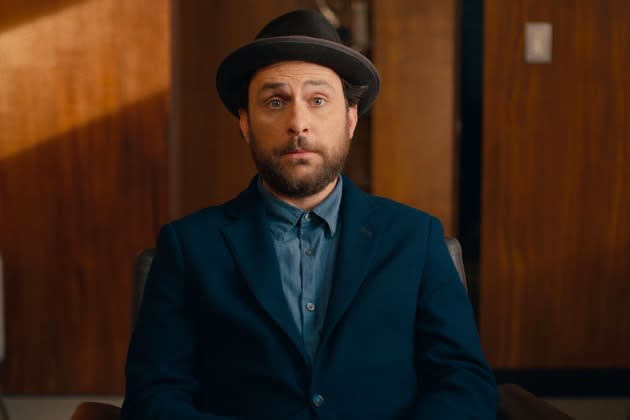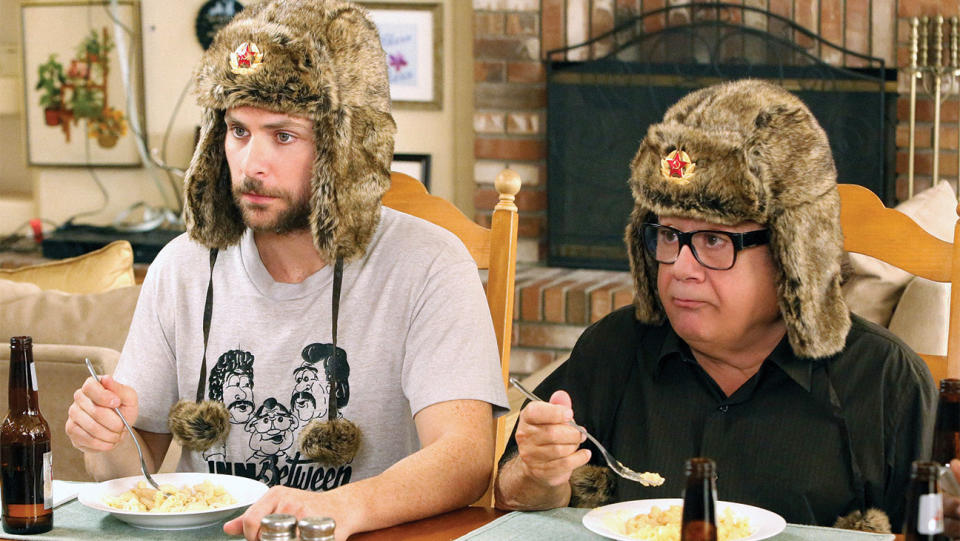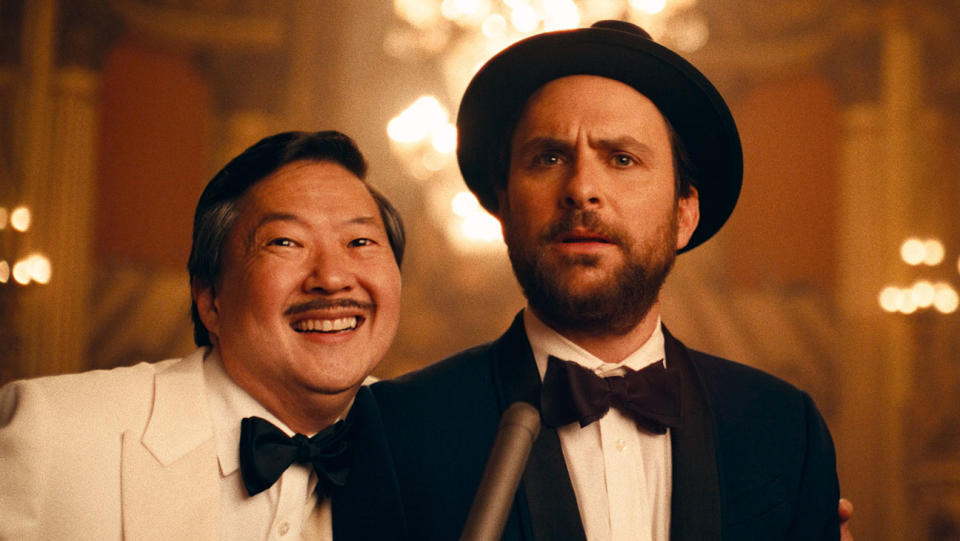Charlie Day on the Long Road to Directing ‘Fool’s Paradise’ and Deciding to Involve His ‘Always Sunny’ Pals
- Oops!Something went wrong.Please try again later.
- Oops!Something went wrong.Please try again later.
- Oops!Something went wrong.Please try again later.

Charlie Day’s feature directorial debut hits theaters Friday when Roadside releases Fool’s Paradise, a satire in which he plays a man who is unable to speak but becomes an accidental Hollywood star. Day, who voices Luigi in the smash hit The Super Mario Bros. Movie, is no stranger to leading his own projects.
Back when he was stuck in the audition trenches, Day met fellow aspiring actors Rob McElhenney and Glenn Howerton, and the trio realized they shared not only comedic sensibilities but also frustrations about landing roles. They started making short films at home, and these would ultimately evolve into It’s Always Sunny in Philadelphia, which premiered on FX in August 2005 with all three as executive producers. (It moved to FXX in 2013.)
More from The Hollywood Reporter
Charlie Day Skips Press Line at 'Fool's Paradise' Premiere Amid Writers Strike
Hollywood Flashback: In 1987, 'Fatal Attraction' Would Not Be Ignored
Hollywood Flashback: In 1989, Nicolas Cage Stuck His Neck Out for 'Vampire's Kiss'
“There was a real magic at making the show in the first three, four or five seasons that can’t be recaptured because we [now] know the characters so well, and we know the show so well,” Day tells The Hollywood Reporter. He likens that feeling to how he felt during the Fool’s Paradise process as well: “That unknowingness is a really wonderful place to be.”
The series features Mac (McElhenney), Charlie (Day) and Dennis (Howerton), plus Dennis’ sister, Sweet Dee (Kaitlin Olson), as the self-centered foursome running the Philly bar Paddy’s Pub. The comedy began developing a cult following in its first season, but concerns about ratings put a second season in doubt until the network suggested adding a bigger name: Danny DeVito as Frank, father to Dennis and Dee. The move helped Sunny shine; the show is now TV’s longest-running live-action sitcom and is set to launch season 16 on June 7.

As Day explains, any fears that inserting an established star like DeVito could hurt the project have proven unfounded: “We’d spent two to three years developing this very handheld, gritty thing. So you start to wonder, ‘Is it going to ruin what the show is?’ And, of course, it was the complete opposite.”
In the rest of the below interview (conducted prior to the start of the writers strike), Day discusses how Sunny cohorts including Howerton and DeVito helped with the film, what he learned after getting advice from Guillermo del Toro and why the upcoming season of the show feels like a classic one.
Is it hard to believe how popular Super Mario Bros. Movie has been?
I’m working with such an incredible team and a really stellar cast in that, so just to be along for that ride is an embarrassment of riches for me, personally. I have a hard time wrapping my head around stuff like that. It’s Always Sunny in Philadelphia is a good example. I’ve never been able to tell how popular the show is, even though we just did some live performances, we’re selling out stadiums and people are screaming. And yet I still go through my life assuming, “Eh, nobody knows who I am.”
When did you first have an idea about putting Fool’s Paradise together?
Around 2014, I started just taking notes — in a notepad and even on my cell phone — and just ideas about a silent character pulling a Mr. Magoo through show business. Or using the model of Peter Sellers and Hal Ashby’s Being There and saying, “Is there a way to do the same sort of structure as Forrest Gump or Steve Martin’s The Jerk, that classic structure of a guy failing upwards? Could I do it in Hollywood?” Then I cobbled together a first draft between seasons of It’s Always Sunny because I was starting to feel just much more comfortable in my writing process of how to get something from conception to completion.
And then showed it to a few friends but didn’t really do anything with it until years later. Then I started doing the circuit with it probably a year or two later. It wasn’t until 2017 that I got together with [producer] John Rickard — we had just released Fist Fight, and we had done Horrible Bosses together. I hadn’t thought of John because he’d done big studio movies. He was one of the few people that I bounced the script off, and I knew that he loved it. But what I knew and loved about John was he got stuff done. So I sat down with John and said, “Listen, if you think you can help me find my way to get this made, I’d love to film it.”
In what ways did leading a film with a mostly silent character create unique challenges?
Yeah, you don’t hear very much from him at all. Writing that character is the easiest dialogue you’re ever gonna write because there’s none. (Laughs.) Acting, it was a lot of fun. Directing, it was tricky because sometimes I would be doing scenes, and because I didn’t have to say anything, I would just be making sure the camera was where it was supposed to be and the actors were saying the lines as I’d like them to say them — and realizing I was forgetting to perform. Some takes were useless. (Laughs.) But I also just wanted that challenge. There were some things I knew I was probably not gonna get the opportunity to do unless I created the opportunity for myself, and one of them was playing a silent character.

You’ve mentioned that you solicited feedback from Guillermo del Toro [who directed Day in Pacific Rim]. What was it like to get notes from someone as established as he is?
It’s incredibly intimidating and humiliating to have to go hat in hand to so many people. There are so many favors that I needed to ask of people in terms of, “Hey, can I get onto the Fox lot for three days?” And I have to write a letter begging to shoot on the weekend at a third of the cost. But what was amazing and really hopeful and inspiring was just how many people — not everyone, of course — along the way were willing to lend something to the movie. The scene in which I’m the method actor stuck in his trailer, I’m filming in Danny DeVito’s trailer, which he rented to me for one dollar.
In terms of Guillermo, the biggest mistake I made as a filmmaker was not reaching out to my more established filmmaker friends earlier in the process. I just never wanted to bother anybody, and it was only until I had already had a version of it shot that I was in over my head. That’s when I reached out to friends to say, “OK, let me get some thoughts, if you’re willing to give them.” (Laughs.) The smarter thing to do is sit down with them all earlier in the process.
It’s definitely fun to see Glenn in the Fool’s Paradise trailer. How did the conversation go in terms of involving people from Sunny in the film?
Initially, I didn’t want to maybe have too many It’s Always Sunny in Philadelphia people in the movie because I think probably in 2017, my instinct was that I didn’t want to take the audience out of the story. And then slowly but surely over the course of making the film, I reached out to every single one of them (laughs) and asked them to do something in the movie because, not only are they great friends and great performers, but they really are, for me, my greatest collaborators.
I love Glenn to death as a performer and a person, and I knew that he would give a great performance. He wanted to do some stuff with the character which was a little bit outside of what I was thinking. But I just like Glenn so much and said, “Listen, Glenn, you do your thing.” And then I even reached out to Rob at one point, too, but I think he was over at Wrexham working on the soccer show, so he couldn’t come fill in for me for something. There are a lot of It’s Always Sunny in Philadelphia people, both in front and behind the camera, who helped make this thing happen.
What are you most excited for Sunny fans to see in season 16?
It was a really fun season in terms of the writing. This last year, we started podcasting, and it was an interesting way to reflect on the early years of the show, and what we liked and what we didn’t like. But we got closer to the characters in the show in a way that I felt was really invigorating, writing this season. So I think it’s a really strong season from a character perspective. We discovered some things about the characters, and there’s some stories that just feel like classic Sunny to me, personally.
A version of this story first appeared in the May 10 issue of The Hollywood Reporter magazine. Click here to subscribe.
Best of The Hollywood Reporter
Natalie Portman at Cannes: "I Need to Leave the Drama for the Screen"
Ailing ‘Superman’ Star Valerie Perrine Finally Finds Her Hero: "The Guy Should Be Sainted"

